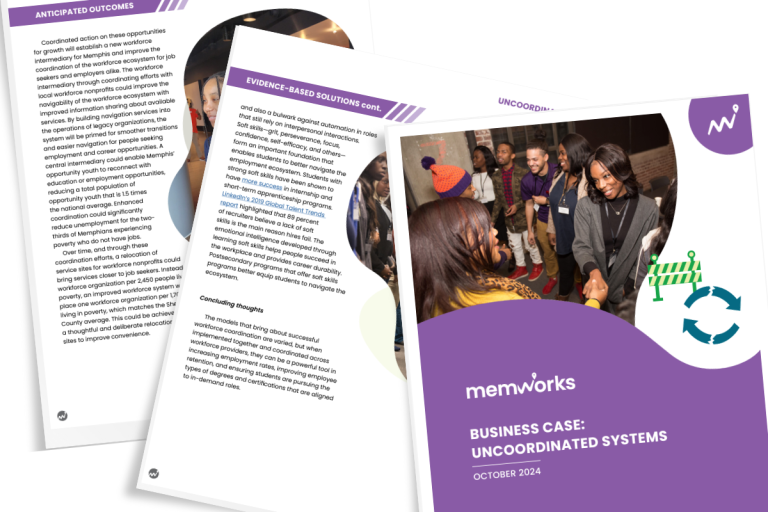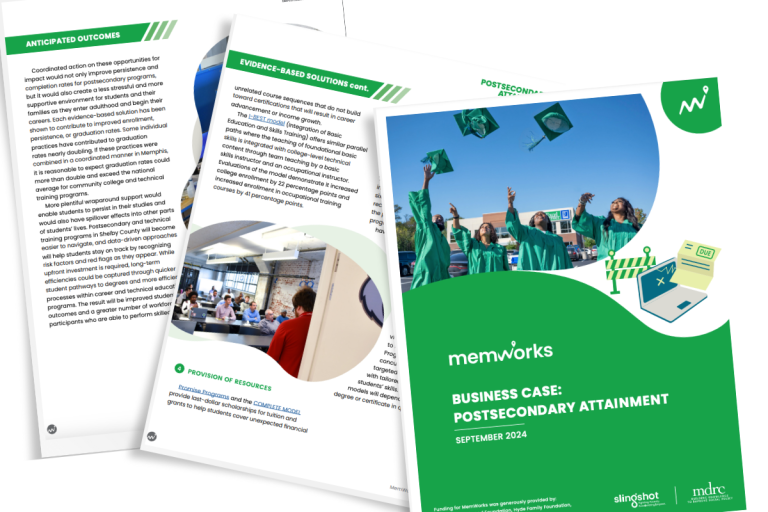The prevalence of people who have experienced trauma requires work environments that provide evidence-based supports
MemWorks has helped us identify the root causes that are impeding employment pathways for Memphians experiencing poverty. An accurate understanding of these roadblocks is absolutely essential, but without knowing how to effectively overcome these roadblocks, we are still unable to enable pathways to living-wage jobs.
We are excited to share evidence-based interventions that can help our community overcome these roadblocks. This email shares a roadmap for ways workforce programs can support job seekers in better aligning their aptitudes and interests with in-demand living-wage careers.
More than 360,000 people in Shelby County have experienced one or more traumatic childhood experiences
Childhood trauma is unfortunately common in Memphis, and a person with four or more adverse childhood experiences (ACEs) is over twice as likely to earn less than $10,000 per year and nearly 2.5 times more likely to be out of work than a person who did not experience ACEs. There is a strong correlation between the number of traumatic events experienced in childhood and the probability of negative life outcomes, including job problems such as absenteeism or performance challenges. This makes trauma-informed practices in work environments critical to unlocking career success for Memphians experiencing poverty.

Evidence-based solutions can help workforce programs and employers support people experiencing the long-term effects of trauma
Four evidence-based models were identified that can effectively help address the effects of trauma in technical training and workplace environments:
- Cognitive Behavioral Intervention for Trauma in Schools (CBITS) incorporates cognitive behavioral therapy for school students to address symptoms of PTSD, anxiety, and depression related to exposure to violence. CBITS, in some formats, can be implemented by teachers and school counselors with no formal mental health training
- Multi-tiered System of Supports (MTSS) is a broad framework used by schools to organize all behavioral interventions across domains. The system provides a method of early identification and intervention that can help struggling students catch up with their peers.
- The Sanctuary Model is an employer-specific template for organizational change based on principles of trauma theory to create safe and nonviolent workplace settings.
- Meditation-based Stress Management encompasses several meditation programs that employ mindful breathing, body scan meditation, and yoga. This technique can be employed in a variety of environments and has been shown to have a positive impact on people dealing with stress, anxiety, depression, or burnout.
Case examples: Trauma Supports

Economic Mobility Pathways (EMPath) is a Boston-based nonprofit. Its comprehensive program supports low-income women and families towards economic self-sufficiency through job coaching, skills development, and psychological support, including managing chronic stress to enhance economic mobility. Given Memphis’s significant economic mobility challenges, where a minuscule percentage of children from the lowest economic tier reach the top tier, EMPath’s holistic approach could be highly beneficial.
A path forward for Memphis
Advance Memphis, Agape Child & Family Services, Empowered To Connect (Memphis Family Connection Center), Persevere, and Youth Villages implement programs with evidence-based trauma-informed practices consistent with the approaches described above. Many other organizations across Memphis are working to adapt their programming to support people who have experienced trauma.
There are several opportunities to improve supports for jobseekers who are experiencing the long-term effects of trauma:
- Embed trauma-informed care and soft skills training in K-12 career classes and experiential learning
- Embed or enhance trauma-informed practices into soft skills training and wraparound support within technical training curricula
- Conduct awareness campaigns for employers
- Provide greater access to mental health services for employees
Together we can help job-seeking Memphians experiencing poverty be more successful in the workplace by helping address trauma and its many repercussions.





